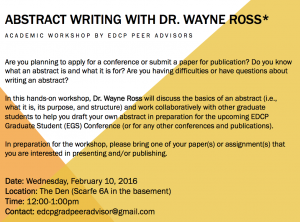Call for Papers: The Labour of COVID section of Workplace: A Journal for Academic Labour
As instructors and students brace for a fall semester taught on-line, the effects of COVID on the labour of post-secondary learning continue to set in. Course outlines and assessment criteria are being reworked. Students wrestle with rising tuition and the prospects of prolonged periods of unemployment. As recent Canadian Association of University Teachers survey results suggest, the pandemic is making higher education even less tenable for current and prospective students. International students stuck in their home countries will be forced to participate in classes across time zones. Research programs are being put on hold. Making matters worse, the gutting of teaching and learning resources at some universities have forced administrators to piece together support for instructors and staff ill-equipped to make the transition on-line. Workloads have increased. But in the midst of this crisis, some post-secondary institutions seek opportunity to advance particular agendas. It was only after significant backlash from students and lecturers that the UK’s Durham University halted its attempt at providing online-only degrees in its effort to significantly cut in-person teaching. In Alberta, the government has merely delayed a performance-based funding model as a result of COVID, signaling that austerity, not improving the quality of education, is driving policy decisions. Meaningful interventions by faculty associations have been limited as the collegial governance process is sidelined for the sake of emergency pandemic measures. And what of academic and support staff who face increase workloads and the prospects of limited child care when the fall semester resumes? To this concern, what are the gendered effects of COVID? What do these circumstances mean for precariously employed sessional and term instructors? This special edition of Workplace invites all academic workers to make sense of COVID through a work and employment lens. Possible themes include:
- Faculty association responses to a shift towards on-line education
- “Mission creep” and the lure of distant learning for post-secondary institutions: opportunities and threats
- The gendered and racialized implications of COVID in the classroom and on campus
- Implications for sessionals, adjuncts and the precariously employed
- COVID and workplace accommodations: from child care to work refusals
- Student experiences and responses
- COVID and performance-based funding policies
- COVID and the collective bargaining process
- Internationalization and the COVID campus
Aim and Scope: Workplace: A Journal for Academic Labor is a refereed, electronic, open access journal published by a collective of scholars in critical higher education promoting a new dignity in academic work. Contributions are aimed primarily at higher education workplace activism and dialogue on all issues of academic labour.
Invitations: Contributions from all ranks of academic workers – from tenured and tenure stream to graduate students, sessional instructors, contract faculty, and administrative support staff – are encouraged to submit.
Deadlines: Submissions will be considered for peer review and publications on a rolling basis. The final deadline is February 28, 2021. A complete volume of The Labour of COVID will be complete and made available in the spring of 2021. Formatting and submission guidelines can be found here
https://ices.library.ubc.ca/index.php/workplace/information/authors
Please direct questions about the special issue to Dr. Andrew Stevens at Andrew.stevens@uregina.ca




